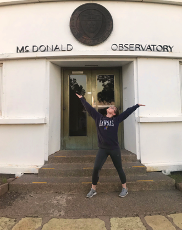Taylor Plattner
Grad Student

As a part of my experience here at Georgia Tech, I have joined our team’s ambitious new project, Oceans Across Space and Time (OAST), which is “a mission to Earth” that’s designed to address gaps in our understanding of how properties of brines in extreme terrestrial environments affect their habitability and record of preservation. By characterizing the physical and chemical challenges and metabolic opportunities in different environments that together determine habitability, we will better understand the fundamental nature of interactions between organisms and their environment, and how these can be measured and preserved. My work focuses on the intersections of astrobiology, analog fieldwork, geobiology, and remote sensing. My research draws upon my past work on “Hairy Blobs”, that will be helpful in determining how these environments change over time and how preservation operates in these extreme conditions. I hope to understand the preservation of life in extreme environments and to better understand the relationship between life and environment well enough, to inform the search for potentially habitable environments beyond Earth.
In undergrad, I pursued a B.S. degree in physics and astronomy with a minor in astrobiology at the University of Kansas (KU). My interest in learning more about the universe and the potential for life on other planets led me to participate in multiple research projects at KU and elsewhere. The research that influenced me the most was the work I did with Dr. Alison Olcott at KU. The goal for the project was to determine if “Hairy Blobs” – unusual structures preserved in evaporite minerals grown in acidic saline lakes – found in halite from the mid-Permian Opeche Shale in the subsurface of North Dakota – were organic bodies, as claimed by a previous author. This project was very interesting to me because I was intrigued with the fact that we can look on our own planet to find halite, which is also found on Mars, and determine if these structures are microbial remains that could potentially tell us more about microbial environments on other planets. I was fascinated by the potential to understand life in planetary environments, which is what ultimately led me to apply to Georgia Tech’s PhD program and work with Dr. Britney Schmidt.